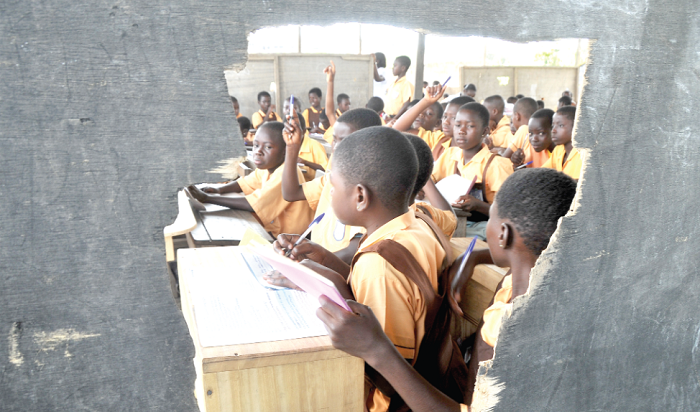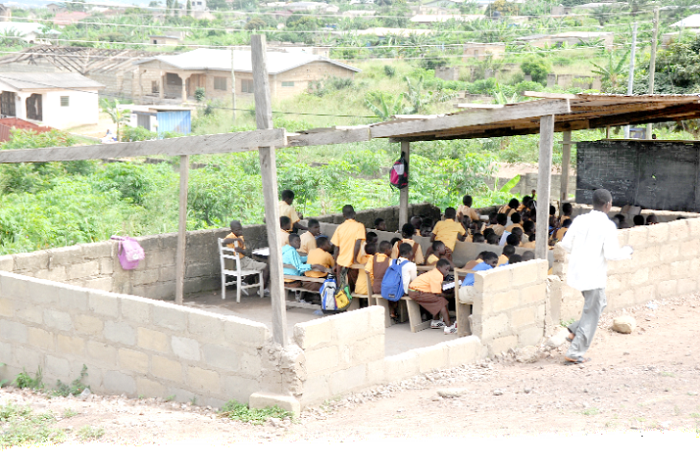
Right to free education in Ghana - An educational ‘apartheid’ or reality?
The rains are out but the fields are dank with dew and the air is as pale as death. The morning is gravely cold and his nose is red and clogged with rheum. He coughs repeatedly—it is harmattan. All he has on his scrawny and fragile body is a school uniform.
Advertisement
It is a faded cream shirt whose buttons have popped and hems have ripped; the shorts are brown and part of his darkened buttocks peek through it. There are holes that have defied all efforts of alteration.
As though these are not gut-wrenching enough for an eight-year-old, Abu carries a wooden desk on his head. On that same head are little bald spots spread all over like islands dotted on the Caribbean Sea—it is the aftermath of a ringworm infection. However, the pressures on Abu’s head do not affect the beautiful pictures he paints in his head. He wants to be a pilot.
He hangs his sneakers on his neck as he takes his routine walk down the path that leads to the only primary school—a “national cake” supposedly enjoyed by most children from two other sprawling communities. Unfortunately, it is not a buffet so, Abu comes with his wooden platter—his desk— to receive his share.
Carrying a desk to school is a routine many like him in the Achiaman M/A Basic School in the Ga West Municipality and other deprived communities in Ghana endure on a daily basis to access their right to free quality education.
Laws
The right to education is guaranteed in Ghana’s 1992 Constitution which states in Article 38(2) that “The Government shall within two years after Parliament first meets after coming into force of this Constitution draw up a programme for the implementation within the following 10 years for the provision of a Free, Compulsory Universal Basic Education.”
Additionally, the Education Act, 2008 (Act 778) and the Children’s Act, 1998 (Act 560) also guarantee the right to education in Ghana. Act 560 consolidates the law relating to children by providing for the rights of the child, maintenance and adoption, and by regulating child labour, apprenticeship and related matters.
However, its implementation appears to be perpetuating an ‘educational apartheid’ where the rich find quality in private schools, leaving the poor in low-cost private schools and poorly funded public schools which are bedevilled with so many challenges.
Although access to basic education has significantly shot up due to government interventions including the Capitation Grant, School Feeding Programme and infrastructure projects, it is not having the desired impact in creating a conducive environment for teaching and learning.
Parents who do not trust the quality of education at the basic level are turning to private schools which tend to be expensive, as well as low-cost ones, which tend to be cheaper but the quality of education cannot be vouched for.
Problems
There seem to be an endless cycle of problems with the untimely release of funds, inadequate textbooks and furniture which ultimately affect the quality of education, particularly at the basic school level in public schools and low-cost private schools.
“Ventilation in the rooms is poor and with 65 to 80 students per class, the condition is quite uncomfortable for teaching and learning” the Headmaster of the Achiaman M/A Basic School Mr Christian Akyianu,said of the challenges in his school.
“Access to adequate furniture remains a challenge for both the primary and JHS. A dual desk meant for two pupils is usually shared by three pupils – so you can imagine the challenge with managing class sessions.”

Not many children are fortunate to have quality education, including information technology
“Teaching and learning materials are limited. We are doing our best with the few text books that we have which at best are shared by pupils in ratio of three to one, and this is in the case of English Language for example.
“The textbooks are inadequate. Those that are worn out are not replaced, making the situation dire, especially in the case of textbooks for subjects such as Religious and Moral Studies. Due to this, parents are encouraged to purchase copies of the textbook for their children,” he explained.
In 2004, the Kufuor administration abolished tuition fees in public basic schools and replaced it with the Capitation Grant – funds government gives for the running of the schools. Although the funds are said to be woefully inadequate (GH¢ 4.5 per pupil), they also arrive late.
Even worse, according to Mr Akyianu, he never receives the full amount. There are deductions made at the regional and district education directorates.
In his estimation, an amount of GH¢15 would be adequate for the grant but more important, it should be to be paid on time.
That assertion is shared by Mr Emmanuel Obeng Amoako, a primary two teacher of the Sapeiman M/A Basic School also in the Ga West Municipality.
Schools running shift
He told the Daily Graphic that while the government was doing its best to support the schools with the Capitation Grant and other investments, they were not adequate.
He pointed to a number of broken down chairs and said “the school has to pay for them to be fixed with the PTA paying the bills.”
Faced with space constraints, the Sapeiman M/A Basic School runs a shift system where the morning session begins from 7a.m. to 12.30 p.m., with the afternoon shift starting from 12.30 p.m.
That situation, Mr Amoako said encouraged truancy among pupils, hence it is affecting academic performance. This puts the pupils at a disadvantage considering the fact that they already have less contact hours compared to their compatriots in other schools who spend more than eight hours in the classroom.
Infrastructure problems are widespread and not limited to only rural or peri-urban schools such as the Sapeiman M/A Basic School.

Ghana is still struggling to provide adequate infrastructure in basic school
Crowded classrooms
At the Adentan Community School, the Headmistress of the school, Ms Florence Kushitor, said while free education was good because every child had the right to be in school, there were major constraints including infrastructure. Here, although lucky to have a science laboratory, it is empty.
“We sometimes have to turn people away. We are not supposed to do that but our enrolment figures are overstretched. We are supposed to be taking a maximum of 45 pupils per class because that is what the classrooms can accommodate but we have more than 60 in a class. Other schools have between 70 and 90”.
She also alluded to increasing cost of running public schools such as hers which had to depend on Capitation Grant but added that PTA levies largely helped to complement the school’s finances as it had to pay its own utility bills, as well as pay other non-teaching staff, including a cleaner.
But those additional fees, the Vice-Chairman of the Sapeiman M/A Basic School, Mr Habakuk Ayittey Lomo, said increased the financial burden on parents.
“They say it is free education which means the children will not pay fees but will be taught well, but the reality is that we pay many petty fees that when I add up, I’m not sure it will be as high as paying school fees.
Years back in the 1970s to 80s, when I was in school, when we pay fees, the government provided us with chairs, tables, books, pencils, pens, erasers and sharpeners but today we buy all those things.
“Today, we say free education but it is not easy. We spend money on textbooks, writing notebooks and exercise books, PTA levies, fines for not being able to attend PTA meetings, examination fees among others.”
He maintained that the education his children were receiving was not quality because apart from the academic work, the food the children were fed as part of the School Feeding Programme was “nothing to be proud of.”
He, however, said the quality of tuition at the school was much better than a private school he enrolled his children two years ago because “although they were topping the class in that school, here, they place fifth or sixth every term.”
Pupils’ perspective
Interestingly, the pupils of the Sapeiman M/A Primary School believed that although teaching and learning in their school was good, they still had the impression that when sent to one of the popular private schools in the municipality—Rev. John Teye Memorial School— they would be sent to a lower class.
Schooling in an environment where laboratories exist only on paper, they observed that their peers in the private schools did better because of facilities, including science and Information Communication Technology (ICT) laboratories and libraries.
Jennifer and Priscilla are not new to the right to free quality education concept which they rattled easily but were candid with the fact that those rights were violated when they were sent home because they could not pay examination fee, PTA levy or other fees.




